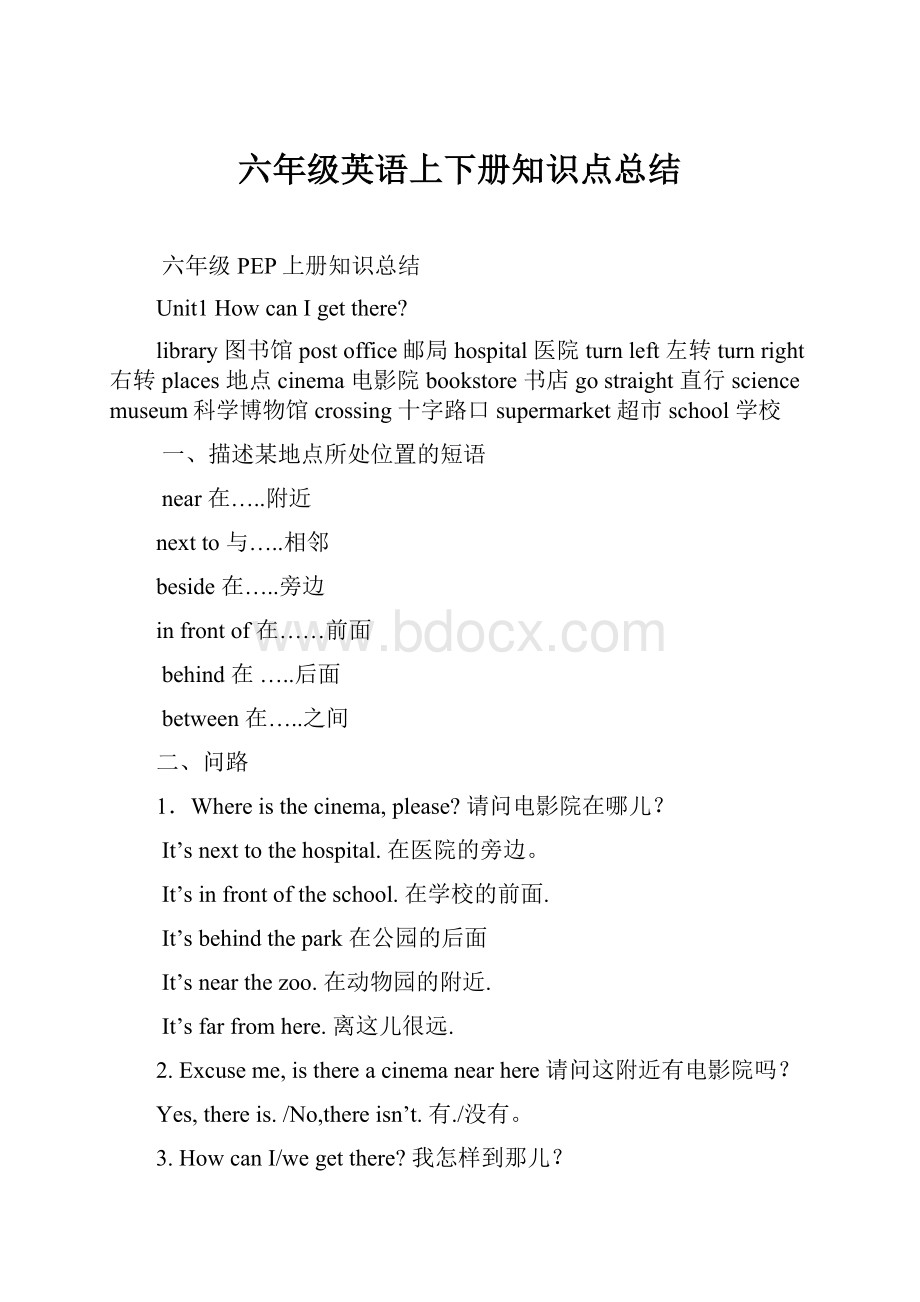六年级英语上下册知识点总结.docx
《六年级英语上下册知识点总结.docx》由会员分享,可在线阅读,更多相关《六年级英语上下册知识点总结.docx(13页珍藏版)》请在冰豆网上搜索。

六年级英语上下册知识点总结
六年级PEP上册知识总结
Unit1HowcanIgetthere?
library图书馆postoffice邮局hospital医院turnleft左转turnright右转places地点cinema电影院bookstore书店gostraight直行sciencemuseum科学博物馆crossing十字路口supermarket超市school学校
一、描述某地点所处位置的短语
near在…..附近
nextto与…..相邻
beside在…..旁边
infrontof在……前面
behind在…..后面
between在…..之间
二、问路
1.Whereisthecinema,please?
请问电影院在哪儿?
It’snexttothehospital.在医院的旁边。
It’sinfrontoftheschool.在学校的前面.
It’sbehindthepark在公园的后面
It’snearthezoo.在动物园的附近.
It’sfarfromhere.离这儿很远.
2.Excuseme,isthereacinemanearhere请问这附近有电影院吗?
Yes,thereis./No,thereisn’t.有./没有。
3.HowcanI/wegetthere?
我怎样到那儿?
Turnleftatthebookstore.到书店左转
4.HowcanIgettothehospital?
我该怎样到达医院呢?
TaketheNo.57bus.乘坐第57路公汽。
BytheNo.57bus.
注意:
到那儿getthere
到某地gettoCanada/Australia/Beijing/Shanghai/Wuhan
gettothehospital/zoo/bookstore
二、指引路
1.YoucantaketheNo.32bus.你可乘坐312路公交车去那儿.
注意:
YoucangobytheNo.32bus.与上句意思一样,只是说法不同。
2.Gostraightandturnleftatthebookstore.先直行然后在书店那儿左转弯。
3.Turnright/leftatthe…在…地方向右/左转.
三Isitfarfromhere?
离这儿远吗?
Yes,itis./No,itisn’t.是的很远/不是很远。
四.第79页的常用表达法
Unit2Waystogotoschool
一.知识点归纳
(一)、词汇四会
Bike(自行车)by(乘坐)slowdown(慢下)bus(公共汽车)foot(脚)stop(停下)train(火车)how(怎样)plane(飞机)gotoschool(上学)ship(轮船)taxi(出租车)ferry(轮渡)sled(雪橇)subway(地铁)(交通工具前加by,表示乘坐但步行要用onfoot)
(2)、重点句型
(3)①询问交通方式用疑问代词how
n——Howdoyougo/cometoschool?
你怎样去/来上学?
——UsuallyIgo/cometoschoolonfoot.通常我走路去/来上学。
——Howdoeshe/she/Petergo/cometoschool?
他/她/皮特怎样去/来上学?
——He/Sheusuallygoes/comestoschoolbybike.他/她通常骑自行车去/来上学。
——Howdoesyourfathergotowork?
你父亲怎样去上班?
——Hegoestoworkbysubway.他坐地铁去上班。
②询问地点,用疑问代词where
Whereisyourhome?
你家在哪里?
It’snearthepostoffice.在邮局旁边。
Wherearetheteachers?
老师们在哪儿Theyareintheteacher’soffice.在老师的办室。
③问路
Howcan/doIgettotheFuxingHospital?
我怎么到福星医院?
YoucantaketheNo.1bus.
④交通规则(trafficrules)
Slowdownandstopatayellowlight.黄灯面前要减速并停下来Stopandwaitataredlight.红灯面前停下来并等待Goatagreenlight.绿灯行.
课本第16页的一些交通规则
InChinaandtheUSAdriversdriveontherightsideoftheroad.在中国和美国,司机靠右行驶。
InEnglandandAustralia,driversdriveontheleftsideoftheroad.但是在英国和澳大利亚,司机靠左边行驶。
第79页的常用表达法
Unit3Myweekendplan
一.知识点归纳
(一)、词汇四会
Nextweek下周newspaper报纸thismorning今天上午comicbook漫画书time时间thisafternoon今天下午wordbook单词书thisevening今天晚上dictionary字典tonight今夜tomorrow明天postcard明信片takeatrip去旅行naturepark自然公园seeafilm看电影bookstore书店gotothesupermarket去超市Visitmygrandparents参观祖父母zoo动物园
二、重点句式和句型:
本单元中出现的一个重点语法是一般将来时:
表示将要发生的动作或状态,常和表示将来的时间连用。
构成:
陈述肯定句:
主语+begoingto+动词原形+其他
否定句:
主语+be+notgoingto+动词原形+其他
一般疑问句:
Be+主语+goingto+动词原形+其他特殊疑问句:
特殊疑问词+一般疑问句?
将来时态还可以用情态动词will+动词原形表示
例1.Iamgoingtovisitmygrandparentsthisafternoon.Iwillvisitmygrandparentsthisafternoon.
2.Iamnotgoingtovisitmygrandparentsthisafternoon.Iwon’tvisitmygrandparentsthisafternoon.
3.Areyougoingtovisityourgrandpaents?
Yes,Iam./No,Iamnot.
4.Willyouvisityourgrandparents?
Yes,Iwill./No,Iwon’t.
注意:
won’t=willnot
5.What(什么)areyougoingtodotomorrow?
Iamgoingtohaveanartlesson.
Where(哪儿)areyougoing?
Wearegoingtothebookstore.
When(什么时候areyougoing?
I’mgoingnextSunday./at3:
00/tomorrow/thismorning.
How(怎样)areyougoing?
Iamgoingbybus/onfoot.Iamgoingtotakeabus.
Who(谁)areyougoingwith?
Iamgoingwithmymother/sister/friend.
三、重点句型:
1.常用表达法:
Whatareyougoingtodotomorrow?
你明天打算做什么?
I’mgoingtohaveanartlesson.我要去上美术课。
We’regoingtodrawsomepicturesinRenminPark.我们要到人民公园去画画Whereareyougoing?
你们打算去哪?
Wearegoingtothecinema.我们打算去电影院Whenareyougoing?
你们什么时候去?
2.课文中的重点语句
Ihavetodomyhomeworknow.
MycousinJackisgoingtovisitmenextweek.
We’regoingtoseeafilmaboutspacetravel.
Haveagoodtime,
Ihvelotsofcomicbooksaboutspace.
WhynotgoonTuesday?
Whynot后面接动词原形,表示建议,意思是:
为什么不?
MygrandmawilltellusastoryaboutChang’e.
Whatareyougoingtobe?
Whatdoyouwanttobe?
I’mgoingtobeabusinessman.Iwanttobeabusinessman.
Unit4Ihaveapenpal
知识点归纳:
一.本单元主要是谈论某人的兴趣爱好。
二.语法是动词的-ing形式和动词的第三人称单数形式。
三.词汇dance(dancing)跳舞sing(singing)唱歌hobby(爱好)playfootball(playingfootball)踢足readstory(readingstories)看故事dokungfu(dotingkungfu)练武术live(lives)居住,住like(likes)喜欢teach(teaches)教study(studiesChinese学习汉语)go(goes)去goeshiking去远足watch(watchesTV)看电视read(reads)读cook(cooksChinesefood制作中国食物)do(does)doeswordpuzzles玩字谜
4.句型:
5.1.询问某人的爱好:
----Whatareyour/his/her/Peter’shobbies?
/----Whatdo/doesyou/he/shelike?
Ilikereadingstoriesandsinging.
He/Shelikesswimmingandplayingfootball.
2.由助动词Do/Does引出的一般疑问句:
Doyou/they/weliveinSydney?
.Yes,I/they/.wedo.No,I/they/wedon’t.
Doeshe/she/xxxliveinSydney?
Doeshe/she/xxxlikedoingwordpuzzlesandgoinghiking?
Yes,he/shedoes.No,he/shedoesn’t.
助动词Do/Does引出的问句中一定有一个实意动词,为动词原形。
助动词一出现,后面动词就不变。
五.语法:
一般现在时的用法
(1)表示经常或习惯性的动作或状态,常与everyday/morning/evening,often,usually,always等状语连用。
如:
Wedomorningexerciseseveryday.Heusuallygoestoschoolbybike.
结构:
肯定句:
主语+动词原形或者单三式动词+其他。
如:
IteachEnglish.
MisswhiteteachesEnglish.
否定句:
主语+don’t/doesn’t+动词原形+其他
如:
Idon’tteachEnglish.Misswhitedoesn’tteachEnglish.
一般疑问句:
Do/Does+主语+动词原形+其他?
如:
DoyouteachEnglish?
DoesMissWhiteteachEnglish?
肯否定回答:
Yes,Ido./No,Idon’t.Yes,shedoes.No,shedoesn’t.
六.课文中的重点语句:
Helivesonafarm,sosometimeshereadstothecows.IliveinBeijing.
Healsolikessinging.
I’mgoingtoteachhimtheChinesesong”JasmineFlower”
I’mwritinganemailtomynewpenpalinAustralia.
CanIalsobehispenpal?
Sure.Whynot?
Doyouwanttolearnaboutrobots?
Heteachesstudentstomakerobots.
Whodoesthedishes?
Whoteachesmath?
Whocooksnoodles?
Unit5Whatdoeshedo?
一、知识点归纳
(一)词汇四会
singer(歌手)writer(作家)HongKong(香港)headteacher(校长)dancer(舞蹈家)sea(大海)worker(工人)cleaner(清洁工)factory(工厂)postman(邮递员)driver(司机)stay(保持)businessman(商人)secretary(秘书)university(大学)TVreporter(电视台记者)help(帮助)fisherman(渔民)money(金钱)scientist(科学家)gym(体育馆)policeofficer(警察)use(使用)pilot(飞行员)footballplayer足球运动员type(打字)coach(教练)quickly(迅速地)
(二)重点句型
①询问职业
Whatdoeshedo?
/Whatishe?
他是做什么的?
Heisadoctor.他是一个医生。
Whatdoyoudo?
/Whatareyou?
你是做什么的?
I’mastudent.我是一个学生。
②询问工作的地点
Wheredoyouwork?
你在哪儿工作?
Iworkinaschool.我在一个学校工作。
Wheredoesshe/yourmotherwork?
她/你妈妈在哪儿工作?
Sheworksinahospital.她在一个医院工作。
一般疑问句:
Doesheworkinafactory?
他在工厂工作吗Yes,hedoes.是的。
Howdoesyourfathergotowork?
你父亲怎么去上班Hegoestoworkbycar.他开车去上班。
④Heworksveryhardandstayshealthy.他工作很努力而且保持健康。
Weshouldstudyhardandstayhealthy.我们应该努力学习并且保持健康。
Heworksatsea.Heworksonaboat.Hehasaveryhealthylife.
Heisgoodatfootball.Shewantstoworkinanoffice.
Unit6Howdoyoufeel?
重点单词:
angry生气的seeadoctor看病afraid害怕的takeadeepbreath深吸一口气sad难过的counttoten数到十worried担心的wear穿happy高兴地more更多的
重要句型:
Howdoyoufeel?
Iamsad.Ifeelsad.
Howdoeshe/shefeel?
He/Sheissad.He/Shefeelssad.
WhatshouldI/you/he/shedo?
You/He/She/Ishouldtakeadeepbreathandcounttoten.
1、They’reafraidofhim.他们害怕它。
2、Thecatisangrywithhim.这只猫很生他们的气。
3、What’swrong?
yourfatherisill.怎么了你爸爸病了。
4、Don’tbesad.别担心。
5、Heshouldseeadoctorthismorning.
6.Wecangonexttime.7.Maybeourcatischasingamousenow.
8.Heisstuckinthemud.9.Pleasedon’tsitonme.Iwon’tsitonyou.
10.Weshouldn’thurtants.
6
六年级下册知识点总结
第一单元
一、单词
young— younger更年轻的 old-older更年长的tall- taller更高的
short-shorter更矮的 long-longer更长的 thin-thinner更瘦的heavy-heavier更重的 big-bigger更大的 small -smaller更小的
strong -stronger更强壮的
二、句子
1. That's the tallest dinosaur in this hall. 那是这个厅里最高的恐龙
2. You're older than me.你比我大。
3. How tall are you?
你有多高?
I'm 1.65 meters.我身高1.65米。
4. What size are your shoes?
你穿多大号的鞋。
5. My shoes are size37.我穿37号的鞋。
6. Your feet are bigger than mine.你的脚比我的大。
7. How heavy are you?
你有多重?
8. I'm 48 kilograms.我体重48公斤。
三、语法要点
形容词的比较级
1、形容词比较级在句子中的运用:
两个事物或人的比较用比较级,比较级后面一般带有单词than。
than后的人称代词用主格(口语中可用宾格)。
2.形容词加er的规则:
⑴一般在词尾加er ;
⑵以字母e 结尾,加r ;nice---nicer
⑶以一个元音字母和一个辅音字母结尾,应双写末尾的辅音字母,再加er ;big--- bigger thin---- thinner
⑷以“辅音字母+y”结尾,先把y变i,再加er 。
heavy----heavier
3.不规则形容词比较级:
good/well-better
例句:
(1).It's taller than both of us together.它比我俩加起来还高。
(2).Your feet are bigger than mine.你的脚比我的大。
(3).I’m heavier than you.我比你重。
第二单元
一、单词
clean打扫--cleaned(clean 的过去式)打扫 stay停--stayed(stay的过去式)停留wash洗—washed洗watch看—watched看 have患病—had患病sleep睡觉—slept睡觉 read读—read读 see看见—saw看见last上一个的yesterday 昨天 before在…之前
二、短语
clean myroom打扫我的房间 wash my clothes 洗衣服stay at home 呆在家里 watch TV 看电视 goboating 划船read a book 读书 see a film 看电影 have a cold 感冒sleep 睡觉(过去式slept)climb a mountain 爬山 cooked dinner做饭 cook noodles 面条
三、句子
1. How was your weekend?
你周末过得怎么样?
2. It was good/fine/ok,thank you.很好,谢谢!
3. What did you do last weekend?
你上个周末干了什么?
4.I stayed at home with your grandma.我和你奶奶呆在家里.(with和谁)
5. Did you do anything else?
你还做了其他什么事吗?
6. Yes,I cleaned my room and washed my clothes.是的,我扫了房间,还洗了衣服。
7.I want to buy the new film magazine.我想买期新的电影杂志。
8.Did you see a film?
你看电影了吗?
No,I didn’tI had a cold. I stayed at home all weekend and slept.没有,我感冒了。
整个周末都呆在家里睡觉。
(肯定回答Yes,I did.)
四、 语法知识:
一般过去时
1.一般过去时表示过去某个时间发生的动作或存在的状态,常和表示过去的时间状语连用。
一般过去时也表示过去经常或反复发生的动作感谢。
2.Be动词在一般过去时中的变化:
⑴am 和is在一般过去时中变为wa